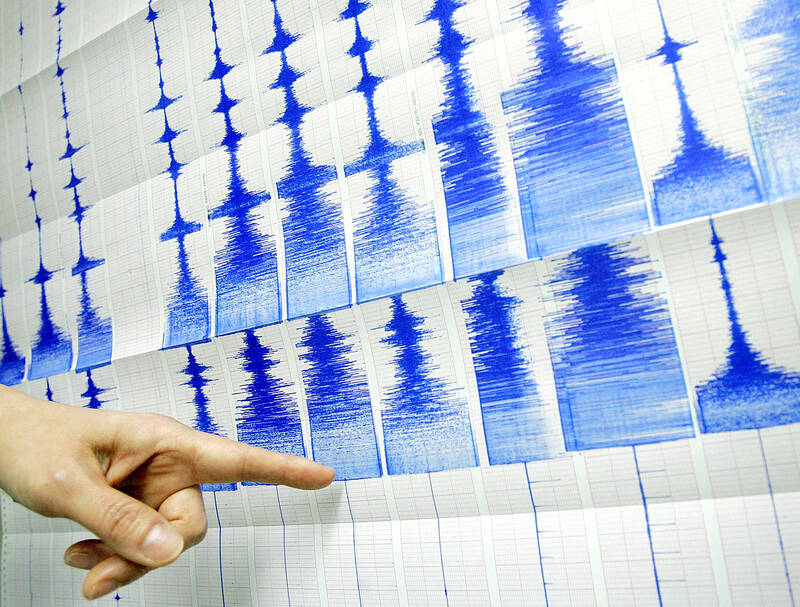The National Center for High-Performance Computing (NCHC) and Academia Sinica have developed an artificial intelligence (AI) model that could help researchers predict earthquakes one day in advance.
The model could predict earthquakes based on precursors to tectonic activity, researchers said.
The research team, led by Academia Sinica researcher Lee Lou-chuang (李羅權) and NCHC associate researcher Tsai Tsung-che (蔡宗哲), developed an AI model using total electron content (TEC) data and the Taiwania 2 supercomputer.

Photo: Jameson Wu, Reuters
The model could predict a magnitude 6 or higher earthquake one day in advance by analyzing data from the previous 30 days, they said.
Past studies also found that atmospheric TEC within a 50km radius of the epicenter of an earthquake show signs of change prior to a large earthquake, the Central Weather Bureau’s Seismological Center said, adding that TEC above Taiwan proper was low just before the 1999 Jiji earthquake.
National Taiwan University researcher Jhuang, Hau-Kun (莊皓琨), who was also on the research team, on Saturday said the team analyzed TEC data from Europe spanning 2003 to 2014.
“By filtering out certain information such as the disturbance storm time index, sunspot data and the solar radiation index, we were able to accurately determine hourly TEC changes,” he said.
The team also used data from 19 cases of TEC changes in which an earthquake did not occur to improve the accuracy of the AI model, he said.
“The system can now predict when a magnitude 6 or higher earthquake will occur, but we are still limited by the resolution of ionospheric data, and we cannot say for sure where the epicenter will be,” he said.
“We also have to work with a data transmission delay of five days or so, since our global ionospheric data are provided by Europe,” he added.
The team also found that the concentration of radon levels in the ground changes before a major earthquake, Academia Sinica researcher Fu Ching-chou (傅慶州) said, adding that the level of change increases with the earthquake’s intensity and proximity to the epicenter.
“We hope that through all of these factors we will be able to determine more accurately when a major quake will occur, so that we can notify people and ensure their safety,” he said.
The team’s findings have been published by the journal Earth and Space Science.

Alain Robert, known as the "French Spider-Man," praised Alex Honnold as exceptionally well-prepared after the US climber completed a free solo ascent of Taipei 101 yesterday. Robert said Honnold's ascent of the 508m-tall skyscraper in just more than one-and-a-half hours without using safety ropes or equipment was a remarkable achievement. "This is my life," he said in an interview conducted in French, adding that he liked the feeling of being "on the edge of danger." The 63-year-old Frenchman climbed Taipei 101 using ropes in December 2004, taking about four hours to reach the top. On a one-to-10 scale of difficulty, Robert said Taipei 101

Nipah virus infection is to be officially listed as a category 5 notifiable infectious disease in Taiwan in March, while clinical treatment guidelines are being formulated, the Centers for Disease Control (CDC) said yesterday. With Nipah infections being reported in other countries and considering its relatively high fatality rate, the centers on Jan. 16 announced that it would be listed as a notifiable infectious disease to bolster the nation’s systematic early warning system and increase public awareness, the CDC said. Bangladesh reported four fatal cases last year in separate districts, with three linked to raw date palm sap consumption, CDC Epidemic Intelligence

US climber Alex Honnold left Taiwan this morning a day after completing a free-solo ascent of Taipei 101, a feat that drew cheers from onlookers and gained widespread international attention. Honnold yesterday scaled the 101-story skyscraper without a rope or safety harness. The climb — the highest urban free-solo ascent ever attempted — took just more than 90 minutes and was streamed live on Netflix. It was covered by major international news outlets including CNN, the New York Times, the Guardian and the Wall Street Journal. As Honnold prepared to leave Taiwan today, he attracted a crowd when he and his wife, Sanni,

Taiwanese and US defense groups are collaborating to introduce deployable, semi-autonomous manufacturing systems for drones and components in a boost to the nation’s supply chain resilience. Taiwan’s G-Tech Optroelectronics Corp subsidiary GTOC and the US’ Aerkomm Inc on Friday announced an agreement with fellow US-based Firestorm Lab to adopt the latter’s xCell, a technology featuring 3D printers fitted in 6.1m container units. The systems enable aerial platforms and parts to be produced in high volumes from dispersed nodes capable of rapid redeployment, to minimize the risk of enemy strikes and to meet field requirements, they said. Firestorm chief technology officer Ian Muceus said